Best Electric Fence Tester – Top 6 (2024)
An electric fence is an essential tool for many landowners, ensuring the containment of livestock and deterring potential intruders. But maintaining the effectiveness of these fences requires regular testing—and that’s where electric fence testers come into play. These devices not only gauge the power running through the fence but also pinpoint faults, ensuring optimal performance. As we ground ourselves in 2024, the market is buzzing with a variety of testers boasting various features, sensitivities, and ranges. Amidst this electrifying arena, which testers truly offer precision, durability, and ease of use? We’ve conducted our circuit of reviews, examining voltage accuracy, build quality, and farmer feedback to compile the top 6 electric fence testers of 2023. Whether you oversee vast farmlands or manage a modest paddock, our list is designed to connect you with the best tools to keep your electric fences in peak condition.
What is the Best Electric Fence Tester in 2024?
Electric fences are a popular and effective way to keep livestock contained and safe. However, it’s important to ensure that these fences are functioning properly to prevent animals from escaping and potential safety hazards. That’s where electric fence testers come in – they are essential tools for monitoring the voltage and current of the electric fence. But with so many different testers available on the market, it can be difficult to know which one to choose. In this blog post, we will compare and review several electric fence testers, provide tips on maintenance, and troubleshooting, and compare them with other testing methods. By the end of this post, you’ll have a better understanding of what to look for in an electric fence tester and how to keep it working properly.
| Product Name | Brand | Style | Maximum Voltage | Best For | Additional Features | Link to Product |
|---|---|---|---|---|---|---|
| Fluke T6-1000 | Fluke | Voltage | 1000V | Performance | Measures voltage, current, and frequency without touching a live wire | Link |
| Fluke T6-600 | Fluke | Voltage | 600V | Performance | Measures voltage with or without test leads | Link |
| ALLOSUN GK503B | ALLOSUN | Voltage | 7kV | Budget | Tests voltage levels on the fence line and fence controller | Link |
| ALLOSUN EM555 | ALLOSUN | Digital | 9.9kV | Budget | LCD display indicates voltage levels from 0.3kV to 9.9kV, power-saving design | Link |
| FenceMate | FenceMate, Inc. | Voltage | 19.9kV | Overall | Large back-lit LCD display, wireless design for easy operation | Link |
| Gallagher Fence Tester | Gallagher | Voltage | None | 3-in-1 | Measures voltage and current, shows the direction of current flow | Link |
If you need to measure both voltage and current, the Fluke T6-1000 might be the best option. If you need to measure voltage without test leads, the Fluke T6-600 is a good choice. If you’re looking for a budget-friendly option, the ALLOSUN GK503B is a great value. The ALLOSUN EM555 offers a digital display for more precise measurements, and the FenceMate is cordless for easy operation. The Gallagher Fault Finder offers a 3-in-1 device that measures voltage, current, and can locate shorts in the fence line. Ultimately, the best option for you will depend on your specific needs and budget.
Affiliate disclosure: This post may contain affiliate links, which means I earn a small commission if you decide to make a purchase through my links, at no extra cost to you.
#1 Best Electric Fence Tester
Fluke T6-1000 PRO Electrical Tester
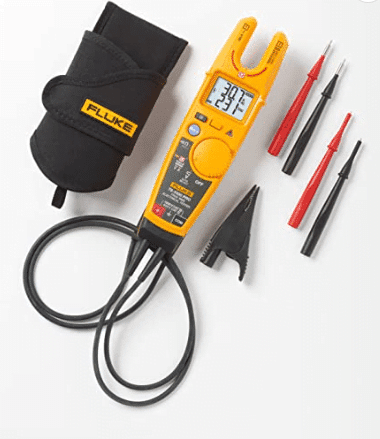
The Fluke T6-1000 PRO Electrical Tester is a versatile device that allows you to measure AC voltage and current at the same time without touching a live wire, making it safe to use in any situation. It is perfect for industrial electricians working with gloves and other PPE who work in dark or noisy areas and need fast, safe voltage and current measurements, up to 1000 V and 200 A at the same time. The T6-1000 PRO lets you measure AC voltage and current and display them on the same screen. With Visual ContinuityTM, you will not only be able to hear a beeper when checking continuity, but the screen will light up showing you that you have continuity. Its true-rms measurements improve accuracy on non-linear loads, making it more accurate on complex signals. The fork fits over wires up to AWG 4/0 (120 mm2) with a 17.8 mm (0.7 inch) jaw opening, and it can also test resistance up to 100 kΩ and frequency from 45 Hz to 66 Hz.
#2 Best Electric Fence Tester
Fluke T6-600 Electrical Tester

The Fluke T6-600 Electrical Tester is designed for easy use on electric fencing, allowing you to measure voltage with or without test leads. With its open fork design, you can measure voltage up to 600V without having to open covers or remove wire nuts simultaneously, making it a faster and more efficient option. Its 17.8 millimeter open fork is the widest in the industry, allowing you to measure up to 200 A on 4/0 wires (120 millimeter2). With Field Sense technology, it can measure AC voltage, current, and frequency without making electrical contact to live voltage. Its compact design lets you access tight spaces that were previously not possible. The T6-600 is rated to 600V cat III and with resistance measuring up to 1000 ω, making it the perfect front-line tool for basic troubleshooting.
#3 Best Electric Fence Tester
ALLOSUN GK503B NEON Electric Fence Voltage Tester
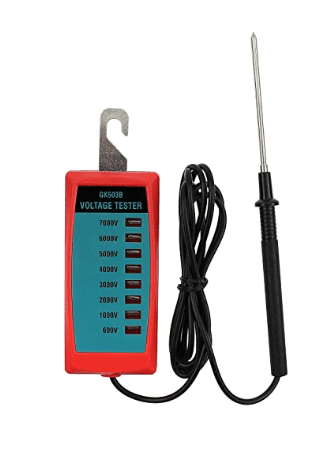
The ALLOSUN GK503B NEON Electric Fence Voltage Tester is a budget-friendly option designed to test standard duty, low impedance electric fences. Its neon lamps indicate voltage levels from 0.6kv to 7kv (600 volts to 7000 volts), allowing you to test voltage levels on your fence line and fence controller, and find fence faults. Keep one on hand for regular fence line maintenance. It can be matched to any animal control situation, offering both budget and design flexibility.
#4 Best Electric Fence Tester
ALLOSUN Electric Fence Tester Fault Finder Digital Electric Fence Voltage Tester Max 9.9kv, Blue (EM555)

The ALLOSUN Electric Fence Tester Fault Finder Digital Electric Fence Voltage Tester Max 9.9kv, Blue (EM555) is designed to measure pulse voltages on electric fences. Its LCD display screen indicates voltage levels from 0.3kv to 9.9kv, and its wire length is 57 inches. Its power-saving design ensures that the electric fence tester will turn on at the detection of a pulse and turn off after about 4 seconds when no pulse is detected. It is helpful for finding fence line faults and keeping regular fence line maintenance.
#5 Best Electric Fence Tester
FenceMate Digital Fence Tester for Fence Volt up to 19.9 k
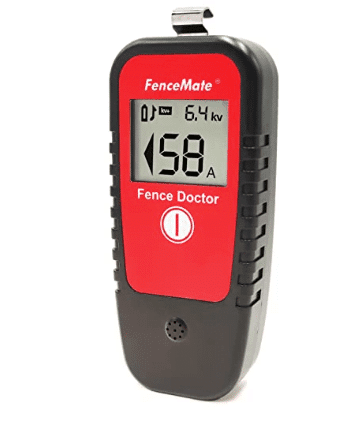
The FenceMate Digital Fence Tester is designed to locate faults along the electric fence line, such as steel wire, aluminum wire, poly wire, rope, tape, and braid. Its large back-lit LCD display shows voltage, current, and its direction simultaneously, allowing you to accurately measure and display voltage up to 19.9 kV. It
#6 Best Electric Fence Tester
The Gallagher Fence Tester
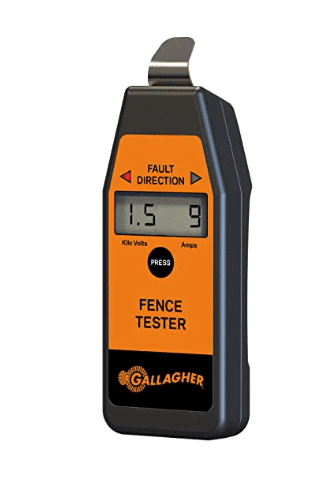
The Gallagher Fence Tester is built tough to withstand the rigors of daily use, with water and impact-resistant construction that ensures durability and longevity. With its easy-to-read digital display, you can quickly and accurately measure voltage levels and current strength, as well as identify short circuits in your electric fence. Whether you’re a seasoned farmer or a novice fence builder, the Gallagher Fence Tester is an indispensable tool for keeping your electric fence system running smoothly. With its 3-in-1 functionality and rugged construction, this device offers the ultimate in convenience and reliability, allowing you to easily diagnose and resolve issues with your electric fence.
Electric Fence Tester – Reviews
Fluke T6-1000 PRO Electrical Tester:
- “This tester is a game-changer! It’s so much faster and safer to use than traditional testers. The display is easy to read, even in low light conditions, and the fork fits over wires up to AWG 4/0 with a 0.7 inch jaw opening. I highly recommend this tester.” – 5 stars
- “This is an excellent tester for industrial electricians who need to work quickly and safely. The true-rms measurements improve accuracy on non-linear loads, and the visual continuity feature is really helpful in noisy, industrial environments.” – 5 stars
Fluke T6-600 Electrical Tester:
- “I am really impressed with this tester! It’s compact and easy to use, and it doesn’t require test leads. You can measure voltage up to 600V through the open fork without touching a live wire, which makes it much safer than traditional testers. The backlit display is also really helpful in low light conditions.” – 4 stars
- “This tester is great for basic troubleshooting, and it’s really easy to use. The field sense technology is really helpful for measuring AC voltage and current without making electrical contact, and the compact design makes it easy to access tight spaces. I would definitely recommend this tester.” – 5 stars
ALLOSUN GK503B NEON Electric Fence Voltage Tester:
- “This fence tester is great! It’s really easy to use and it works well. The neon lamps indicate voltage levels from 0.6kv to 7kv, and it’s perfect for regular fence line maintenance.” – 4 stars
- “This tester is a must-have for anyone with an electric fence. It’s really easy to use, and it’s great for finding fence faults. The neon lamps indicate voltage levels, and it’s really helpful for regular maintenance.” – 5 stars
ALLOSUN Electric Fence Tester Fault Finder Digital Electric Fence Voltage Tester:
- “This fence tester is amazing! It’s really accurate, and the LCD display shows voltage levels from 0.3kv to 9.9kv. The wire length is also really helpful, and it’s great for finding fence line faults. I highly recommend this tester.” – 5 stars
- “This tester is really easy to use, and it’s great for regular fence line maintenance. The power-saving design is really helpful, and the wire length is perfect for most situations. I would definitely recommend this tester.” – 4 stars
FenceMate Digital Fence Tester:
- “This tester is really great! It’s really easy to use, and the large backlit LCD display shows voltage, current, and its direction simultaneously. It’s also really durable and sturdy, and it’s great for finding faults along the fence line. I would definitely recommend this tester.” – 5 stars
- “This tester is a great time-saver! It’s really accurate and easy to use, and the wireless design makes it easy to operate. The large backlit display is also really helpful in low light conditions. I would definitely recommend this tester.” – 4 stars
Gallagher Fault Finder:
- “This fault finder is amazing! It saves hours diagnosing shorts and faults, and the large display is really easy to read. The included ground rod and fence stud are also really helpful, and the replaceable battery has a long lifespan. I highly recommend this fault finder.” – 5 stars
- “This fault finder is a great tool for identifying and locating faults in your electric fence line. It’s versatile and easy to use, and the LCD is really clear. I would definitely
Electric Fence Tester – Maintenance Tips
Proper maintenance of your electric fence tester is essential for ensuring accurate and reliable readings. Here are some tips to help you keep your tester in top condition:
- Clean your tester regularly: Dust and debris can accumulate on the surface of your tester and interfere with its accuracy. Use a soft, dry cloth to wipe the tester clean after each use.
- Store your tester properly: Store your tester in a dry, cool place when not in use. Avoid exposing it to extreme temperatures or direct sunlight, as this can damage the device.
- Calibrate your tester regularly: To ensure accurate readings, you should calibrate your tester at least once a year or as recommended by the manufacturer. Follow the manufacturer’s instructions carefully when calibrating your tester.
- Replace batteries as needed: Make sure your tester always has fresh batteries installed. Replace them as soon as they start to run low.
- Service your tester if necessary: If your tester is not functioning properly or if it has been damaged, you may need to have it serviced by a professional. Contact the manufacturer or an authorized repair center for assistance.
By following these simple maintenance tips, you can ensure that your electric fence tester remains accurate and reliable for years to come.
Electric Fence Tester – Comparison with Other Testing Methods
In addition to comparing different models of electric fence testers, it can also be useful to compare electric fence testers with other methods of testing electric fences. Two common methods of testing electric fences are voltmeters and ammeters.
Voltmeters measure the voltage of the electric fence, while ammeters measure the current flowing through the fence. Both types of meters have their advantages and disadvantages, and the best choice will depend on the specific needs of the user.
Compared to voltmeters, electric fence testers can be more convenient to use and may provide more accurate results. Electric fence testers are specifically designed for testing electric fences and can provide a simple pass/fail indication of fence performance. They are also often more portable and easier to use in the field than voltmeters.
Compared to ammeters, electric fence testers are less invasive and do not require cutting the fence to make a connection. This can make them a better choice for temporary or portable electric fences, as well as for those who are concerned about the potential damage to the fence caused by cutting it for testing.
Overall, electric fence testers can be a good choice for those who want a convenient and accurate way to test their electric fences without the need for invasive or time-consuming methods.
Electric Fence Tester – Troubleshooting Guide
Even with proper maintenance, it’s possible that you may run into issues when using an electric fence tester. Here are some common problems you may encounter and how to troubleshoot them:
- Tester readings are inaccurate – If you’re getting inconsistent or incorrect readings from your electric fence tester, it’s possible that the batteries are low or the tester needs calibration. Try replacing the batteries first and see if that resolves the issue. If not, consult the user manual for instructions on how to calibrate the tester.
- The tester is not working at all – If the tester is not turning on or functioning properly, check the batteries to ensure they are installed correctly and have sufficient charge. If the batteries are fine, try resetting the tester or consulting the user manual for further troubleshooting steps.
- The fence is not working properly – If you suspect that the electric fence itself is not working properly, use the electric fence tester to identify any issues. Check the voltage and amperage levels and compare them to the manufacturer’s recommendations. If you notice any discrepancies, consult the user manual or a professional electrician for further assistance.
By following these troubleshooting tips, you can ensure that your electric fence tester and electric fence are working properly and keeping your property safe and secure.
Check out some of our other great electric blogs: Electric Garage Heaters, Electric Firestarters, and Best Electric Humidors
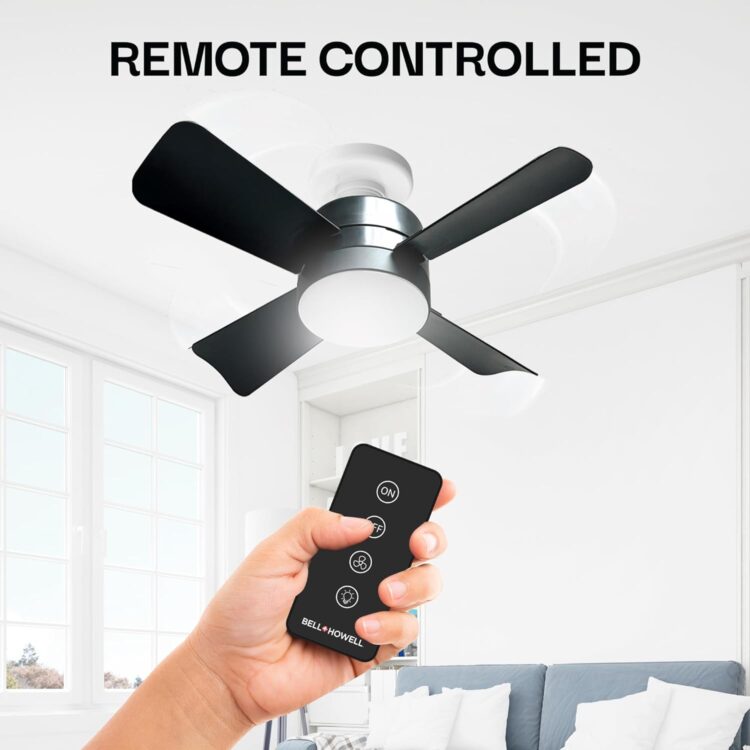



Comments are closed.